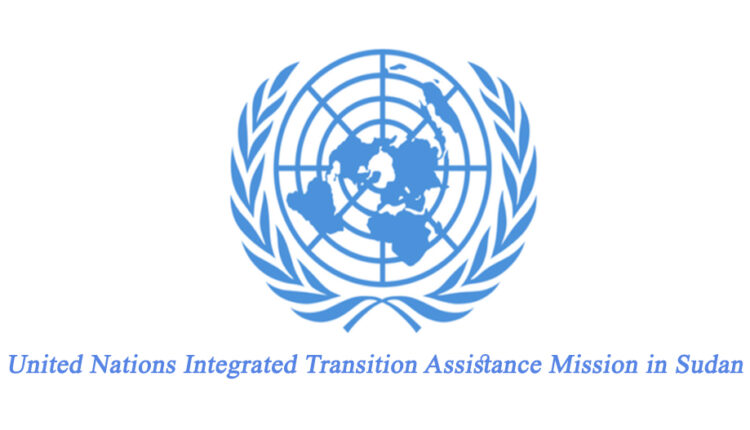SECURITY COORDINATION OFFICER – UNITAMS
Job Description
| Department/Office: | United Nations Integrated Transition Assistance Mission in Sudan |
| Posting Title: | Security Coordination Officer, P3 |
| Job Code Title: | SECURITY COORDINATION OFFICER |
| Duty Station: | KHARTOUM |
| Posting Period: | 18 May 2021 – 16 June 2021 |
| Job Opening Number: | 21-Security-UNITAMS-155705-R-Khartoum (M) |
| Staffing Exercise | N/A |
Org. Setting and Reporting
The position is located in the United Nations Integrated Transition Assistance Mission in Sudan (UNITAMS). The United Nations Security Council adopted resolution 2524 (2020) authorizing the mandate of UNITAMS which is to support the political transition, progress towards democratic governance, in the protection and promotion of human rights, and sustainable peace; to support peace processes and implementation of future peace agreements; to assist peacebuilding, civilian protection and rule of law, in particular in Darfur and the Two Areas; and to support the mobilization of economic and development assistance and coordination of humanitarian assistance.
The position is based in Khartoum and is located in the Security Section. The incumbent will report to the Chief Security Adviser (CSA) through Chief Security Officer (CSO).
Responsibilities
Within delegated authority, the Security Coordination Officer will be responsible for the following duties:
•Prepares draft of security plan for the Mission, designated county or geographic area, including all aspects related to elaboration, development, implementation and updating of the plan.
•Maintains continuing lines of communication with security focal points and all other agencies involved in peacekeeping and other missions to ensure maximum security coordination.
•Serves as a member of the United Nations Security Management Team, when CSO is away, contributing to implementation and evaluation of the effectiveness of the security plan.
•Assesses prevailing local security conditions, identifying security trends and advising UN staff, project personnel and dependents on potential security problems, such as mines, kidnapping, armed attacks, arrest and detention.
•Maintains an ongoing evaluation of air, land and sea evacuation routes and resources for use in emergencies, ensuring the availability of vehicles, aircraft, vessels, fuel supply and accessible roads.
•Ensures that fire detection devices and fire-fighting equipment are available on the premises. Maintains fire evacuation plan and conducts fire drills and training as necessary.
•Maintains office security by conducting physical security inspections of facilities, issuance of identity cards, if possible, background checks, and entry control.
•Provides advice and training to staff and dependents on residential security measures such as window guards, alarm systems and locks to minimize burglar intrusions.
•Maintains dialog with authorities and international institutions such as Red Cross/Red Crescent in the event of natural disasters.
•Ensures availability of emergency communications system by making periodic checks to determine if system is functioning properly; arranges for necessary repairs or adjustments.
•Investigates accidents involving UN vehicles and prepares report of findings.
•Investigates security-related incidents involving UN staff members, project personnel or eligible dependent.
•Assumes responsibility for guard force management.
•Maintains protection detail for senior officials as necessary.
•Conducts security training in such subjects as the security management system, responsibilities of Area Coordinators and Wardens and personal security awareness.
•Performs other duties, as assigned.
Competencies
Professionalism: Knowledge in the field of security risk management, especially of the UNSMS. Ability to make quick decisions in emergencies or when rapid response is required. Ability to communicate complex concepts orally. Ability to produce reports and papers on technical issues and to review and edit the work of others. Ability to apply UN rules, regulations, policies and guidelines in work situations. Shows pride in work and achievements; demonstrates professional competence and mastery of subject matter; is conscientious and efficient in meeting commitments, observing deadlines and achieving results; is motivated by professional rather than personal concerns; shows persistence when faced with difficult problems or challenges; remains calm in stressful situations. Takes responsibility for incorporating gender perspectives and ensuring the equal participation of women and men in all areas of work.
Teamwork: Works collaboratively with colleagues to achieve organizational goals; Solicits input by genuinely valuing others’ ideas and expertise; Is willing to learn from others; Places team agenda before personal agenda; Supports and acts in accordance with final group decision, even when such decisions may not entirely reflect own position; Shares credit for team accomplishments and accepts joint responsibility for team shortcomings.
Planning and Organizing: Develops clear goals that are consistent with agreed strategies; Identifies priority activities and assignments and adjusts priorities as required; Allocates appropriate amount of time and resources for completing work; Foresees risks and allows for contingencies when planning; Monitors and adjusts plans and actions as necessary; Uses time efficiently.
Education
An advanced university degree (Master’s degree or equivalent such as a senior command and staff qualification) in security management or business administration, political/social/military science or international relations with focus on security management.
A first-level university degree in combination with two additional years of qualifying experience in military, police or security management may be accepted in lieu of the advanced university degree; A first-level university degree may be substituted with a diploma from a police or military academy (for commissioned officers), which may be considered its equivalent, and in combination with four additional years of qualifying experience in military, police or security management.
Work Experience
A minimum of five (5) years with advanced university degree (seven years with a first-level university degree) of progressively responsible experience in the military, police or security management is required.
A minimum of five (5) years of progressively more senior experience in security operations management or control, within a military, police or security organization is required.
A minimum of two (2) years of experience in managing multiple and diverse military, police or security units operating in a conflict or post conflict environment is required.
A minimum of one (1) year experience and exposure at the international level is required.
Experience in the management of security units in a United Nations startup mission is desirable.
Languages
English and French are the working languages of the United Nations Secretariat. For this post, fluency in English and Arabic is required. Knowledge of another UN official language is desirable.
Assessment
Evaluation of qualified candidates may include an assessment exercise which may be followed by competency-based interview.
Special Notice
The United Nations Secretariat is committed to achieving 50/50 gender balance in its staff. Female candidates are strongly encouraged to apply for this position.
Please note that due to the ongoing situation with COVID-19 and the travel restrictions imposed by the national authorities, the selected candidate may be required to start the assignment/appointment remotely, in agreement with the hiring manager, and until further notice.
United Nations Considerations
According to article 101, paragraph 3, of the Charter of the United Nations, the paramount consideration in the employment of the staff is the necessity of securing the highest standards of efficiency, competence, and integrity. Candidates will not be considered for employment with the United Nations if they have committed violations of international human rights law, violations of international humanitarian law, sexual exploitation, sexual abuse, or sexual harassment, or if there are reasonable grounds to believe that they have been involved in the commission of any of these acts. The term “sexual exploitation” means any actual or attempted abuse of a position of vulnerability, differential power, or trust, for sexual purposes, including, but not limited to, profiting monetarily, socially or politically from the sexual exploitation of another. The term “sexual abuse” means the actual or threatened physical intrusion of a sexual nature, whether by force or under unequal or coercive conditions. The term “sexual harassment” means any unwelcome conduct of a sexual nature that might reasonably be expected or be perceived to cause offence or humiliation, when such conduct interferes with work, is made a condition of employment or creates an intimidating, hostile or offensive work environment, and when the gravity of the conduct warrants the termination of the perpetrator’s working relationship. Candidates who have committed crimes other than minor traffic offences may not be considered for employment.
Due regard will be paid to the importance of recruiting the staff on as wide a geographical basis as possible. The United Nations places no restrictions on the eligibility of men and women to participate in any capacity and under conditions of equality in its principal and subsidiary organs. The United Nations Secretariat is a non-smoking environment.
The paramount consideration in the appointment, transfer, or promotion of staff shall be the necessity of securing the highest standards of efficiency, competence, and integrity. By accepting an offer of appointment, United Nations staff members are subject to the authority of the Secretary-General and assignment by him or her to any activities or offices of the United Nations in accordance with staff regulation 1.2 (c). In this context, all internationally recruited staff members shall be required to move periodically to discharge new functions within or across duty stations under conditions established by the Secretary-General.
Applicants are urged to follow carefully all instructions available in the online recruitment platform, inspira. For more detailed guidance, applicants may refer to the Manual for the Applicant, which can be accessed by clicking on “Manuals” hyper-link on the upper right side of the inspira account-holder homepage.
The evaluation of applicants will be conducted on the basis of the information submitted in the application according to the evaluation criteria of the job opening and the applicable internal legislations of the United Nations including the Charter of the United Nations, resolutions of the General Assembly, the Staff Regulations and Rules, administrative issuances and guidelines. Applicants must provide complete and accurate information pertaining to their personal profile and qualifications according to the instructions provided in inspira to be considered for the current job opening. No amendment, addition, deletion, revision or modification shall be made to applications that have been submitted. Candidates under serious consideration for selection will be subject to reference checks to verify the information provided in the application.
Job openings advertised on the Careers Portal will be removed at 11:59 p.m. (New York time) on the deadline date.
No Fee
THE UNITED NATIONS DOES NOT CHARGE A FEE AT ANY STAGE OF THE RECRUITMENT PROCESS (APPLICATION, INTERVIEW MEETING, PROCESSING, OR TRAINING). THE UNITED NATIONS DOES NOT CONCERN ITSELF WITH INFORMATION ON APPLICANTS’ BANK ACCOUNTS.


